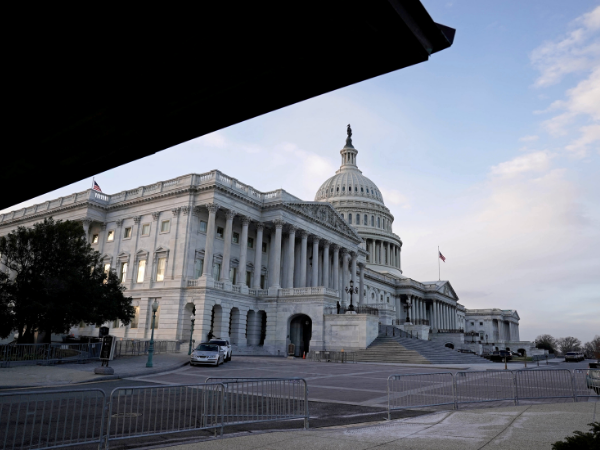U.S. Senate boosts small-state aid in coronavirus aid bill
Democrats in the U.S. Senate said on Thursday they had modified President Joe Biden’s $1.9 trillion coronavirus relief package to steer more aid to smaller U.S. states as they prepared to begin a lengthy debate on the bill.
With no votes to spare, Democrats are tweaking the bill to ensure that all 50 of their members support it. On Thursday, they said they had increased the minimum amount of aid each state would get — a move likely to please those who represent sparsely populated states like Vermont.

A view of the U.S. Capitol Building as the Democrats and Republicans continue moving forward on the agreement on the coronavirus disease (COVID-19) aid package in Washington, D.C., U.S. December 21, 2020. REUTERS/Ken Cedeno/File Photo
The Democratic-controlled Senate is scheduled to reconvene at noon (1700 GMT), and is expected to vote at around 1 p.m. (1800 GMT) on a motion to launch 20 hours of debate on the massive bill. Republicans’ response to the motion will likely be an early indication of the steep opposition the bill faces in the chamber.
Republicans are expected to drag out the process for as long as possible by requiring a full reading of the sweeping legislation that could take up to 10 hours on Thursday. That would be followed by 20 hours of debate and a lengthy series of votes that could run well into the weekend.
“We’re just going to keep drinking coffee and (getting) this thing done because this is about people surviving,” Democratic Senator Debbie Stabenow told reporters on Thursday.
The Senate will convene despite a warning by the U.S. Capitol Police that it had obtained intelligence about a militia group’s possible plot to breach the Capitol on Thursday, a day some conspiracy theorists believe that Republican former President Donald Trump will be sworn in for a second term.
The House of Representatives canceled its Thursday session after the Capitol Police’s warning.
The relief bill, Biden’s top legislative priority, includes funding for vaccines and medical supplies, extends jobless assistance and provides a new round of emergency financial aid to households, small businesses and state and local governments. The has killed more than 517,000 Americans and left millions jobless.
Senate Democrats on Wednesday tightened criteria for stimulus checks so fewer high-income households would qualify.
The compromise means that 9 million fewer households will receive a stimulus payment than in the last tranche of payouts in 2020. It also lowers the cost of the legislation by $12 billion, according to Senate Democrats.
On Thursday, they said they had increased minimum payments to states with smaller rural populations to match the $1.25 billion minimum contained in last year’s CARES Act. The bill passed by the House set the floor at $500 million.
“Small states will secure at least as much as they did in the CARES Act,” Senate Finance Committee Chairman Ron Wyden told reporters.
An increase in the national minimum wage also was dropped after the Senate parliamentarian ruled last week it could not be included.
DELAYING TACTIC
Under Trump, the then-Republican-controlled Senate passed several massive relief packages. Now Republican senators are balking at the price tag of Biden’s bill.
A Morning Consult/Politico opinion poll showed large bipartisan support for the legislation. It said 77% of all voters and 59% of Republicans backed the plan.
Democrats hope Biden can sign it into law before March 14, when some of the current benefits run out.
In the Senate, bills usually require the support of 60 senators. But the coronavirus relief bill is being advanced under a legislative maneuver known as reconciliation that allows passage with a simple majority vote.
The 48 Senate Democrats and the two independents who caucus with them control 50 seats, exactly half the 100-seat chamber, but Vice President Kamala Harris, a Democrat, can cast votes to break ties.
(Reporting by David Morgan and Makini Brice; additional reporting by Richard Cowan; Editing by Andy Sullivan and Alistair Bell)

